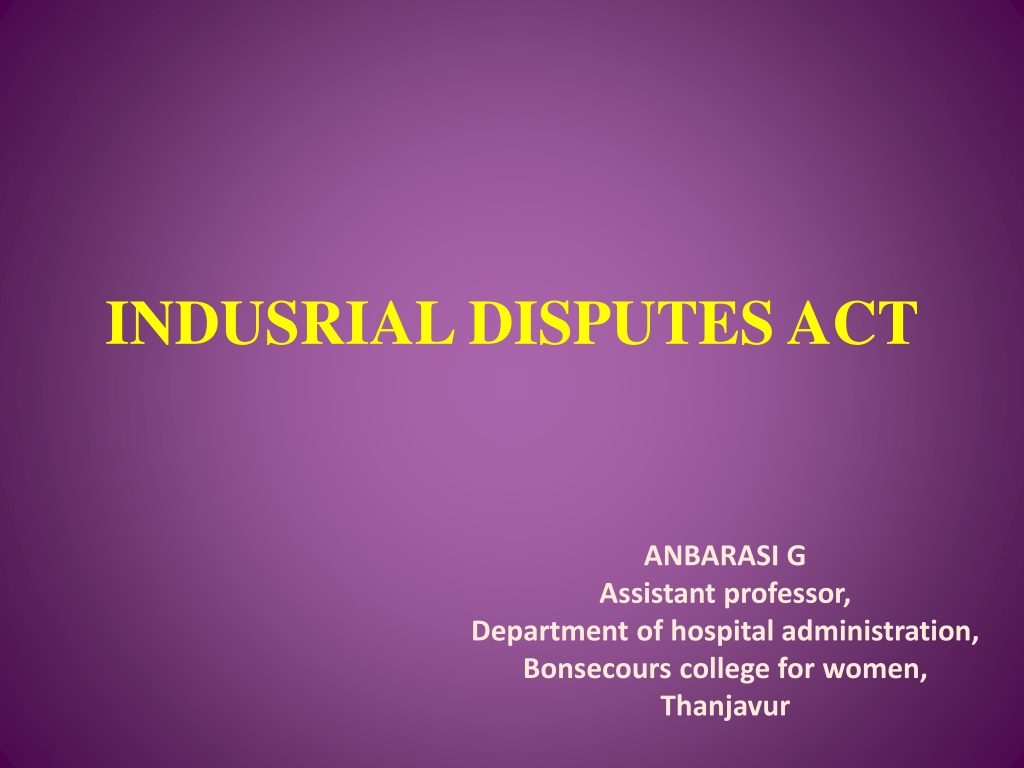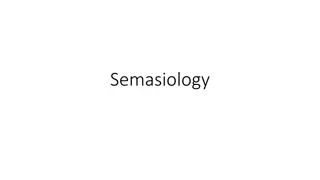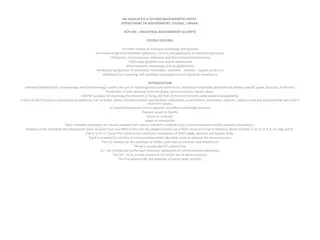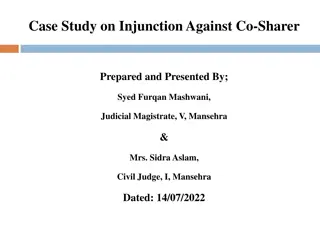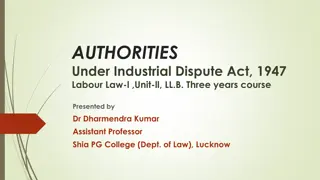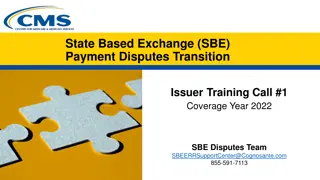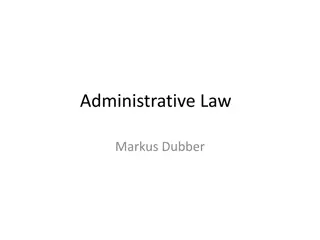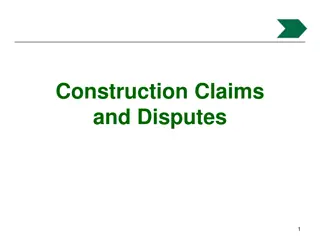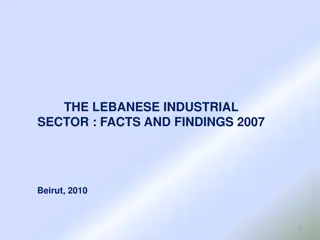Understanding the Industrial Disputes Act: Objectives, Meaning, and Features
The Industrial Disputes Act of 1947 aims to resolve conflicts between employers and employees, promote industrial peace, and safeguard workers' rights. Through mechanisms like conciliation, arbitration, and adjudication, this act helps prevent illegal strikes and lockouts while facilitating collective bargaining. Various authorities are established to settle disputes effectively, ensuring fair treatment of all parties involved.
Download Presentation

Please find below an Image/Link to download the presentation.
The content on the website is provided AS IS for your information and personal use only. It may not be sold, licensed, or shared on other websites without obtaining consent from the author. Download presentation by click this link. If you encounter any issues during the download, it is possible that the publisher has removed the file from their server.
E N D
Presentation Transcript
INDUSRIAL DISPUTES ACT ANBARASI G Assistant professor, Department of hospital administration, Bonsecours college for women, Thanjavur
MEANING OF INDUSTRIAL DISPUTES ACT In the Industrial Disputes Act 1947,an Industrial dispute means Difference between employer and employee or employer and employer or between employer and workmen between workmen and workmen, or any dispute among these which are related to the employment or non-employment or terms and conditions of employment of any persons.
OBJECTIVES OF INDUSTRIAL DISPUTES ACT To secure industrial peace and harmony by providing mechanism and procedure for the investigation and settlement of industrial disputes by conciliation, arbitration and adjudication which is provided under the statue. To promote of measures for securing amity and good relations between the employer and workmen. The prevention of illegal strikes and lockouts. Relief to workmen in the matter of layoff, retrenchment and closure of and undertaking. Promotion of Collective bargaining.
OBJECTIVES OF INDUSTRIAL DISPUTES ACT An investigation and settlement of industrial disputes between employers and employers, employers and workmen or workmen with a right of representation by a registered Trade Union Federation of Trade Unions or Associations of employers or a federation of association of employers.
SALIENT FEATUTRES The salient features of the Industrial Disputes Act, 1947 bear a huge impact on the settlement and prevention of the industrial disputes as well as in amelioration of the conditions of workers, tempered by a practical sense of peaceful co-existence to the benefits of both and to impose restraints on laissez faire. Any industrial dispute may be referred to an industrial tribunal by an agreement of parties to the dispute or by the appropriate government if it deems it expedient to do so. An award declared the arbitrator shall be binding on both the parties to the disputes for the specified period not exceeding one year. It shall be normally enforced by the government.
SALIENT FEATUTRES Prohibition of illegal strikes and lockouts. Compensation to the workmen in cases of layoff, retrenchment and transfer or closure of an undertaking. A number of authorities such as the works committee, conciliation officers, Board of Conciliation, Courts of Equity, Labour courts, Industrial Tribunal and National tribunal are provided for the settlement of industrial disputes. Each one of these authorities plays an important role in speedy redressal of grievances and peaceful and amicable settlement of disputes , thus, ensuring industrial peace.
CASUSES OF INDUSTRIAL DISPUTES Political causes: Political instability strikes against the government affiliation of political parties with unions. Economic causes: Wages, Bonus Safety of work working conditions medical & other facilities.
CASUSES OF INDUSTRIAL DISPUTES Social causes: Low moral in society social values and norms Rich v/s poor disparity class divisions. Psychological causes: Conflict in individual and organizational objectives motivational problems Personality clashes attitudinal problems.
CASUSES OF INDUSTRIAL DISPUTES Managerial causes: Non- recognition of Unions Behaviour of Manager/ Supervisor defective development policies violation of accepted code of conduct. Technological causes: Unsuitable technology difficulty in technology adoption resistance to change fear of unemployment.
TYPES OF INDUSTRIAL DISPUTES Strikes Economic strike- to enforce their economic demands such as wages and bonus. - workers, ask for increase in wages, allowances like traveling allowances, house rent allowances, dearness allowances, bonus and other facilities such as increase in privilege leave and causal leave. Sympathetic strike when workers of one unit or industry go on strike in sympathy with workers of another unit or industry who are already on strike, it is called sympathetic strike. - one union members supports the other union members in strikes for sympathy. -the workers of sugar industry may go on strike in sympathy with their fellow workers of the textile industry who may already be on strike.
TYPES OF INDUSTRIAL DISPUTES General strike by members of all or most of a the unions in a region or an industry. -all the workers in a particular region of industry to force demands common to all the workers. -usually intended to create political pressure on the ruling government, rather than on any one employer. Sit Down strike workers do not absent themselves from their place of work when they are on strike. - keep control over production facilities. - it also know as pen down or tool down and workers present in the place of employment but refuse to work, refuse to leave. - to protest against the non- acceptance of their demands by the state government.
TYPES OF INDUSTRIAL DISPUTES Slow down strike - they do not stop work, but restrict the rate of output in an organized manner. -they adopts go- slow tactics to put pressure on the employers. Sick-out use the sick leave, the sudden loss of so many employees all on one day can show the employer just what it would be like if they really went on strike. Wild cat strikes these strikes are conducted by workers or employees without the authority and consent of unions. - they were protesting against some remarks allegedly made agaist them by an Assistant commissioner.
TYPES OF INDUSTRIAL DISPUTES Lockouts: A lockouts is a work stoppage in which an employer prevents employees from working it is declared by employers to put pressure on their workers. employees refuse to work. Employer s weapon while strike is raised on part of employees.
TYPES OF INDUSTRIAL DISPUTES Picketing When workers are dissuaded from work by stationing certain men at the factory gates, such a step is known as picketing. To stop or persuade workers not to go to work. To tell the public about the strike. To persuade workers to take their union s side.
TYPES OF INDUSTRIAL DISPUTES Gherao Gherao in Hindi means to surround . The workers may gherao the members of the management by blocking their exits and forcing them to stay inside their cabins. The main object of gherao is to inflict physical and mental torture to the person being gheraoed and hence this weapon disturb the industrial peace to be great extent.
